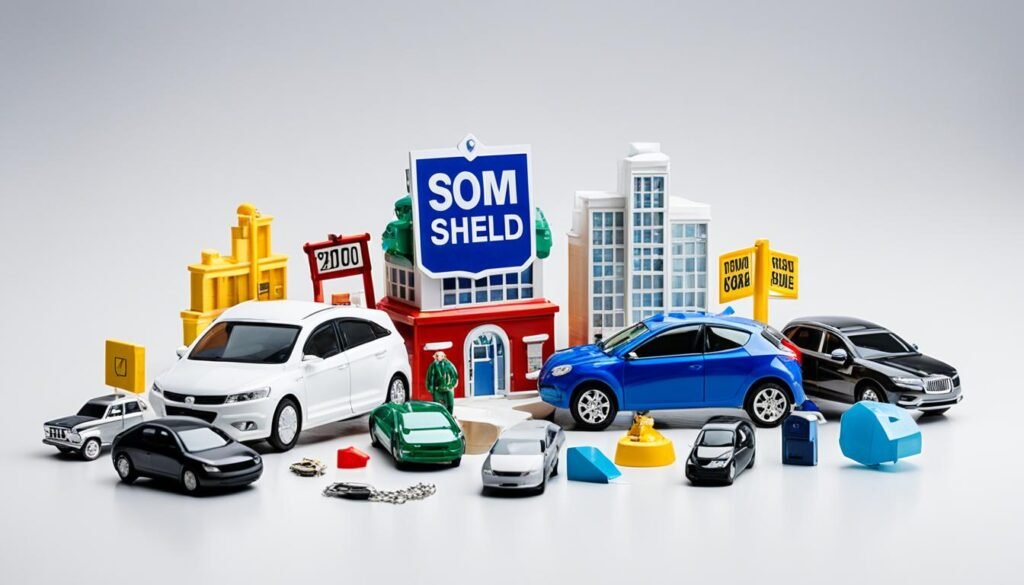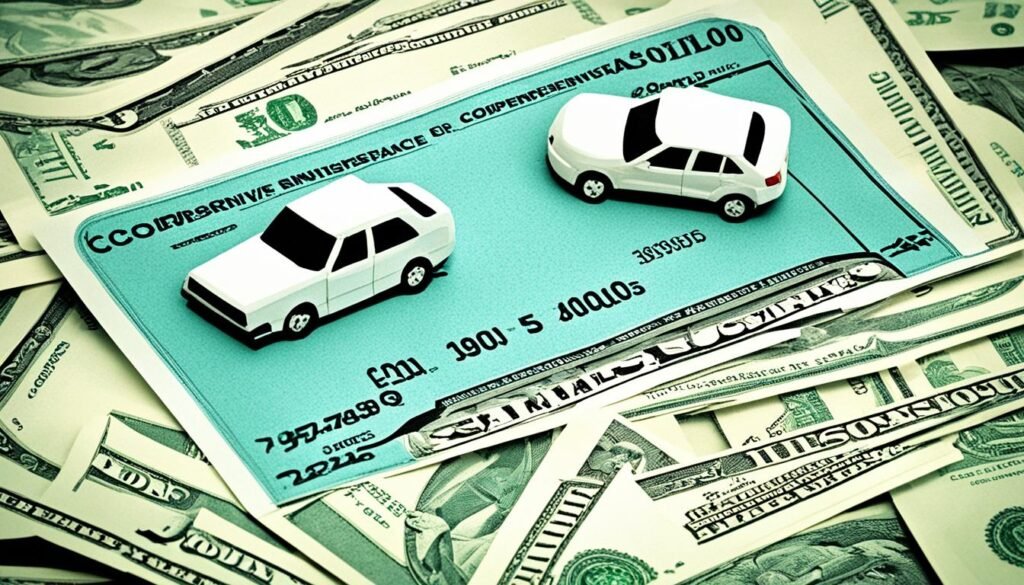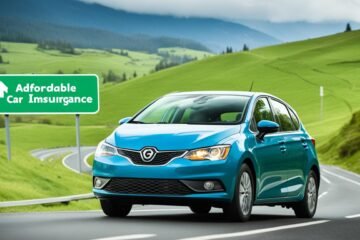Comprehensive Insurance: Protect What Matters Most

Your car is more than just a way to get around. It shows off your style, reflects your values, and is a key asset that needs strong protection. Comprehensive insurance is here to help, offering a broad shield against many risks that could harm your car1.
This type of insurance is for more than just accidents. It covers things like natural disasters, theft, vandalism, and hitting animals. By getting to know comprehensive insurance, you can keep your car and your future safe. This gives you peace of mind and lets you drive with confidence2.
Key Takeaways
- Comprehensive insurance protects you from many unexpected events, like natural disasters, theft, vandalism, and hitting animals.
- It gives you more than basic coverage, keeping your car and your money safe.
- Looking at your needs and the options out there helps you choose the right comprehensive insurance.
- Knowing the costs and what to think about with comprehensive insurance helps you get the most out of it and avoid risks.
- Getting comprehensive insurance is a smart move to protect your important stuff and keep your finances safe on the road.
Understanding Comprehensive Insurance
Comprehensive insurance is key to protecting your vehicle from unexpected events. It’s different from collision insurance, which covers damages from hitting something else. Comprehensive insurance pays for repairs from events not related to a crash3. This includes damage from natural disasters, fire, riots, vandalism, theft, and hitting animals.
Comprehensive insurance coverage is often needed if you’re paying off a car loan or lease. It protects the lender’s investment in your vehicle4. But if you own your car, you can choose if you want this coverage. It lets you pick the protection level that fits your needs and budget.
What is Comprehensive Insurance?
Comprehensive insurance is a car insurance type that covers damages not from a crash3. It covers theft, vandalism, natural disasters, and hitting animals4. It doesn’t cover damages from hitting another vehicle or object.
Key Takeaways
- Comprehensive insurance doesn’t cover collision damage or medical costs3.
- Increasing your deductible can lower your comprehensive insurance costs3.
- Comprehensive insurance is often required with car loans or leases. But, it’s optional if you own your car4.

Coverage Scope of Comprehensive Insurance
Comprehensive insurance protects your vehicle from many damages, not just collisions. It covers damages from natural disasters, falling objects, fire, theft, and vandalism5. This coverage doesn’t help with injuries to others but does protect your car. It’s a smart choice for new or valuable cars5.
What Comprehensive Insurance Covers
In India, comprehensive insurance covers damages from accidents, theft, and natural disasters5. You can also get extra covers like Zero Depreciation and Roadside Assistance5. These options let you tailor your insurance to your needs5.
Comprehensive Insurance vs. Collision Insurance
Comprehensive insurance protects against many risks, while collision insurance is for car crashes6. Most drivers in the U.S. have both types of insurance6. Claims for comprehensive insurance are usually lower than for collision insurance6. This shows comprehensive insurance offers broader protection.

“In 2021, India witnessed almost 4 lakh road accidents, resulting in over 1.5 lakh fatalities and leaving 3.5 lakh individuals injured.”5
With so many accidents, comprehensive insurance is key to protect your car and yourself from various risks56.
Insurance: Costs and Considerations
Cost of Comprehensive Insurance
The cost of comprehensive insurance varies a lot. On average, it costs about $134 per year in the U.S7.. But, it can change based on where you live, your driving record, and your car’s value7. Insurance companies look at the chance of claims in your area to set rates7.
Choosing a higher deductible can lower your premiums, but you’ll pay more out-of-pocket if you make a claim7. Your driving history, claims past, where you live, how often you drive, age, gender, marital status, job, car replacement cost, and credit score also affect the price8.
Insurance rates are based on things that make claims more likely. This includes rising vehicle costs, supply chain issues, risky driving, and weather events like freezes and hurricanes7. Reinsurance rates also play a part, helping companies manage risk and stay stable during big disasters7.
Customers can look for discounts, ask about rate hikes, and compare different insurance companies or agents for better deals on comprehensive insurance7.

“Texas law mandates that insurance rates must be adequate, not excessive, based on sound actuarial principles, reasonably related to all costs, and not discriminatory based on race, creed, color, ethnicity, or national origin.”7
Knowing what affects comprehensive insurance costs helps consumers make better choices. They can find coverage that’s affordable and meets their needs.
Evaluating the Need for Comprehensive Insurance
Deciding if you need comprehensive insurance can be tricky. It offers protection against many unexpected events but isn’t a must-have for everyone. Think about your car’s value, the risk of theft or natural disasters where you live, and your financial situation.
Advantages and Disadvantages of Comprehensive Insurance
Comprehensive insurance has many benefits that can ease your mind and protect your wallet. It covers theft, weather damage, and other major losses not covered by collision insurance9. It pays for repairs up to your car’s actual cash value, minus the deductible, which goes down as your car gets older9. It also covers various incidents like weather events, hitting an animal, theft, and vandalism9.
But, comprehensive insurance has its downsides. It’s more expensive, with the average cost being $1,718 a year9. It doesn’t cover damage from collisions, potholes, normal wear and tear, or stolen personal items from your car9.
Another thing to consider is that filing a claim might raise your insurance rates next year9. Comprehensive and collision coverage are often sold together, so they can’t be bought separately9.
| Advantages of Comprehensive Insurance | Disadvantages of Comprehensive Insurance |
|---|---|
|
|
If your car is new and valuable, comprehensive insurance is usually a good idea9. But, it might not be worth it for older cars with lower value9. It’s often needed for leased or financed cars, but not always for those who own their cars9.
Choosing whether to get comprehensive insurance should be based on your unique situation. Knowing the pros and cons can help you make a smart choice that protects your car and your wallet910.
How Comprehensive Insurance Works
Comprehensive insurance helps cover damages to your vehicle that aren’t your fault. It pays for the car’s actual cash value (ACV), up to your policy’s limit, minus your deductible11.
When you make a comprehensive insurance claim, you pay the deductible, which can be $500, $1,000, or $1,50011. Then, the insurance company pays for the rest of the repair or replacement costs, getting your car back to its old state11.
Comprehensive insurance pays out even if you’re not at fault. It covers things like theft, vandalism, and natural disasters11. The comprehensive insurance claims process includes documenting damage, providing documents, meeting deadlines, and sharing information11.
Comprehensive insurance doesn’t cover damages from collisions, potholes, or normal wear and tear11. But, when combined with collision coverage, it makes a full protection plan for your vehicle and you, known as “full coverage” insurance11.
| Coverage Type | Average Annual Cost |
|---|---|
| Comprehensive Insurance | $17411 |
| Collision Insurance | $37011 |
Comprehensive insurance is often cheaper than collision coverage, making it a smart choice for protecting your vehicle from unexpected events11. Knowing how comprehensive insurance works helps you make the best choices for your car’s safety11.
In summary, comprehensive insurance covers damages not related to collisions, like theft and natural disasters. The comprehensive insurance claims process means paying a deductible and the insurance covering the rest11. Understanding comprehensive insurance coverage details helps you pick the right protection for your vehicle11.
“Comprehensive insurance is a valuable safeguard against unexpected events that can happen to your vehicle, giving you peace of mind and financial protection when you need it most.”
Making the Most of Comprehensive Insurance
To get the most from using comprehensive insurance, it’s key to know what your policy covers and how to file a claim12. In the U.S., the average cost for comprehensive auto insurance is $160 a year12. Most insurers set deductibles for comprehensive coverage between $500 and $150012. By comparing quotes, you can find a comprehensive insurance policy that fits your budget12.
Example of Comprehensive Insurance
Imagine your car gets destroyed in a tornado, valued at $10,000 with a $1,000 deductible. Your comprehensive insurance policy would cover $9,000 for repairs or a new car12. This shows how comprehensive coverage can protect you from big losses in certain situations.
13 Comprehensive car insurance covers things like vandalism, theft, storms, and fire, costing about $263 a year13. Raising your deductible to $1,000 can save you 13% on your yearly insurance13. Plus, safe driving, low mileage, and bundling policies can save you more money13.
14 The yearly cost for comprehensive car insurance averages $367, with prices varying by company14. Your location, the car’s value, and repair costs can affect your comprehensive insurance rates14.
Knowing the comprehensive insurance benefits and how to handle claims ensures you’re well-protected against unexpected events affecting your vehicle121314.
Conclusion
Comprehensive insurance is key to keeping your assets and money safe. It helps you understand the coverage options, costs, and what to think about. This way, you can decide if it’s right for you. It’s especially useful for new or used cars, offering protection against unexpected events15.
The main points from this article show how important comprehensive insurance is. It helps protect your investment and reduce risks. You’ll learn how to get insurance quickly after buying a car and what you need to know about your car’s features for certain used cars. This info makes it easier to find the right insurance for you.
Deciding to get comprehensive insurance means understanding its coverage, costs, and benefits. Think about the pros and cons to see if it’s a good choice for you. It’s about keeping your car, money, and peace of mind safe.
FAQ
What is comprehensive insurance?
What does comprehensive insurance cover?
How much does comprehensive insurance cost?
When is comprehensive insurance necessary?
How does comprehensive insurance work?
What are the advantages and disadvantages of comprehensive insurance?
Source Links
- https://www.marketwatch.com/guides/insurance-services/comprehensive-insurance/
- https://content.naic.org/consumer/auto-insurance.htm
- https://www.investopedia.com/terms/c/comprehensive-insurance.asp
- https://www.progressive.com/answers/comprehensive-insurance/
- https://www.forbes.com/advisor/in/car-insurance/comprehensive-vs-third-party-insurance/
- https://www.forbes.com/advisor/car-insurance/comprehensive-vs-collision-auto-insurance/
- https://www.tdi.texas.gov/consumer/how-are-your-auto-and-homeowners-insurance-costs-calculated.html
- https://www.iii.org/article/what-determines-price-my-auto-insurance-policy
- https://www.nerdwallet.com/article/insurance/comprehensive-auto-insurance
- https://www.cnbc.com/select/what-is-comprehensive-car-insurance-/
- https://www.insurancebusinessmag.com/us/guides/how-does-comprehensive-car-insurance-work-456419.aspx
- https://www.caranddriver.com/car-insurance/a36385235/is-comprehensive-insurance-worth-it/
- https://www.experian.com/blogs/ask-experian/why-did-comprehensive-insurance-get-more-expensive
- https://www.forbes.com/advisor/car-insurance/what-is-comprehensive-car-insurance/
- https://www.ncbi.nlm.nih.gov/books/NBK221332/



0 Comments